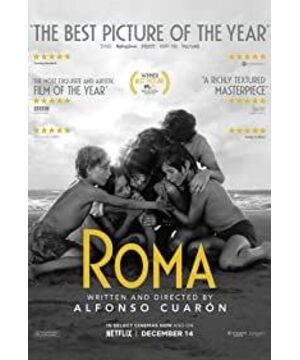In the middle of the night, I flipped through my memo and found some past memories. This is a review I wrote two years ago.
——————
I like this movie very much, and I'm ashamed that I just read it out and watched it recently, and I didn't meet it earlier. This is a story that is rarely seen recently, not to criticize, not to pursue empathy, but to tell a story from a very personal perspective and emotion. Alfonso's storytelling and filming are extremely mature, and I feel like I see a new wave of neorealism.
The entire film is based on the director's childhood experiences, which he also chose to keep private. The alienation of the film echoes the hazy nature of childhood memories. The director seldom uses close-ups or close-ups to describe characters. Nine times out of ten, a scene that is casually paused is a mid-range and long-range view with rich background details. The frequent use of long shots underscores a documentary-like attitude. This brought me a rare experience, that is, I clearly realized that I did not have the right and ability to enter a certain role and think from his perspective. My place can only be a spectator, looking across the time and space of the screen to see how Cleo went through this difficult time, and this important moment in Mexican history for the woman and child of a family Exactly how.
This kind of bystander attitude is not purely created by the shooting technique. The director's handling of the plot and characters also played a great role. Maid Cleo's emotions were light before the climax on the last beach, as if a layer of frosted glass was separated from the world. There are several scenes in the film where Cleo stares through a window or from a high place - during the earthquake she is fascinated by the chaos of the nursery and the babies left behind; during the fire she looks down at the rushing out. The crowd; and she was still staring deeply when the group her ex-boyfriend belonged to violently suppressed the students who marched. It is difficult for us to see any clues of emotions from her expression, as if these big events are in two worlds with her, and she is just an audience member in the play.
Of course, thinking from another angle, the sense of alienation on the one hand reflects the subjectivity of the director's experience and perspective, because his identity and age determine that he cannot penetrate into social movements and more intense struggles, let alone observe and experience. But instead of criticizing Alfonso's lack of discussions on issues such as class and revolution, I think his choice of narrative method is also an attempt to reflect on his own limitations and the problems of Mexican society. It is precisely because we are all standing at the present point in time and reviewing Cleo's experience from the perspective of a bystander. The nice and not nice details.
Finally, on the issue of class: sofi and cleo are people from two different worlds, and they have different survival dilemmas, but this does not prevent the two women from establishing a kind of friendship that transcends class - not family or friendship, but a kind of friendship that can be There is a unique connection and support among women. Even though it may be short-lived, it may not be absolutely equal, but we cannot deny the generation of certain positive feelings and the value and meaning it brings to people. I don't think emphasizing the power of love is to obliterate the disclosure of class issues, or to neutralize the cruelty and authenticity of contradictions and conflicts. The director still clearly shows the audience all the contradictions and oppositions that have always existed, which also benefits from the atmosphere of onlookers he creates. But to think that there is only one comprehensive, holistic critique of class contradictions that is worthy of praise and dissemination of the interpretation of history is itself a kind of overbearing? "Only from a certain point of view, the cruelty and darkness revealed by inspection or even looking down is profound", I do not agree with this view.
Why must we pay attention to war, guns and weapons that bring blood and smoke? We always walk into the country again and again, the language of the ruler and the military, and again and again (whether in a positive or negative attitude) the hegemony of male power and gaze in interpreting and elaborating history. In "Roma", what we see is more water, the sea, and the flowing vitality. In the absence of adult males, the element of water, representing female power, fills the entire film's time and space. The scene where the protagonist walked to the sea at the end moved me so much that they seemed to embrace life completely in the sea.
I couldn't be happier and happier to see more personal, female-perspective narratives in the world of cinema. So let's focus on the people who have been forgotten, on how people live under suffering, on the rhythm of life. This is not only an effective way to deconstruct a grand narrative, but Alfonso uses his films to show the possibility of ordinary people going back to the past and participating in the discussion of history.
View more about Roma reviews











